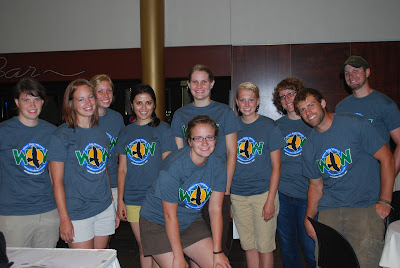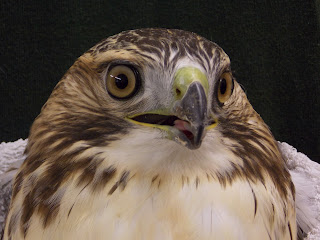Lets spin back time a little ways. We've had several releases these past few weeks! Releases are the epitome of our hard work at REGI. I have to say that working with the patients in the clinic can be an emotional roller-coaster, but releases make everything worth it. I wish everyone could experience the feeling of releasing a rehabilitated bird back into the wild. Here's some photos from our recent releases.
We just love releases. But release wouldn't be possible without rehab, and rehab isn't possible at REGI without support from YOU!
This past weekend we celebrated the 3rd Annual Wings Over Wausau (WOW... great acronym if you ask me!). WOW was a big success this year, we saw several faces from last year, as well as hundreds of new wide-eyed bird nerds in training! Although many people came out to see the birds up close and personal and hear their stories, WOW also featured a silent auction table, vendors, food, and bird games.
Thank you everyone for coming out to support us! We couldn't do it without YOU!!
The Wausau Grand Theater, a beautiful backdrop for the stars of the show!
The staff, interns, and volunteers getting ready for the doors to open!
Mike with a male American kestrel and intern Kerry with a peregrine falcon at the falcon station.
Interns Alyssa and Sarah at the turkey vulture station.
Executive director Marge Gibson with an education Western red-tailed hawk.
Rehabilitator Katie holds a red-tailed hawk stretching her wings over Wausau... get it?
Not a second after getting the birds put away from WOW, we had 2 new patients come through the doors and, the phone rang once more.
A loon had been found up in Ashland, Wisconsin (4 hours from REGI) washed up in a marina on the boat launch. Nothing appeared to be injured and to the staff here at REGI that meant one thing.... lead poisoning. After flying to REGI via airplane, the loon landed safely in Antigo. After drawing blood to check the lead levels our suspicions were confirmed. The lead levels were off the charts.
The common loon shortly after being admitted with an off-the-charts lead level
X-rays from the loon showed 2 lead sinkers in the bird's intestine
After a trip to the Antigo Vet Clinic, the X-rays revealed 2 lead sinkers in the loon. Not a good diagnosis. Lead from the sinkers works its way into the bird's blood and sequesters in the bones. Treatment is time consuming, meticulous, and extremely expensive.
Lead poisoning in birds is 100% human-induced, and loons aren't the only ones that are effected. Eagles, swans, and the endangered California condor are constantly in a battle against lead. One lead sinker can kill an eagle. One lead sinker can kill a swan. One lead sinker could kill REGI's new patient loon. Just ONE. Our unlucky loon has ingested two.
Although not impossible, the road ahead will be a difficult one for this guy. Staff is working round the clock and we have our fingers crossed that the sinkers come out soon so we can begin the road to recovery. Until then, we play a difficult and frustrating waiting game.
** For more information on lead poisoning in wild birds please click here.
** DO YOU FISH? For alternatives to lead tackle please click here.
On a happier note, there are some of our growing babies... one of which has stole the hearts of many... the Virginia rail!
Look at the Virginia rail! He's getting so big (relatively speaking), and is about the size of your palm. He's graduated into an outdoor enclosure!
This young goldfinch came in not long ago without feathers. Hard to believe it's already turning yellow!
This young cardinal is under the wing of an adult male foster parent
This killdeer came in weighing no more than the change in your pocket, but has grown into a stunning young bird. Keep an eye on the blog for an upcoming release!
As happy as I am to share our baby bird updates... I can't stress enough the importance of using non-lead sinkers & ammunition. Just as we've moved away from lead paint in homes for our own health, we now need to focus on a mind-frame to protect the environment we live in.
As a full-time rehabilitator, hunter, and fisherman, I wish every outdoors-man could witness a lead poisoning case first hand. It changes everything.
- Katie Rymer, Assistant Avian Rehabilitator










































.jpg)
.jpg)
.jpg)
.jpg)




.jpg)

.jpg)






